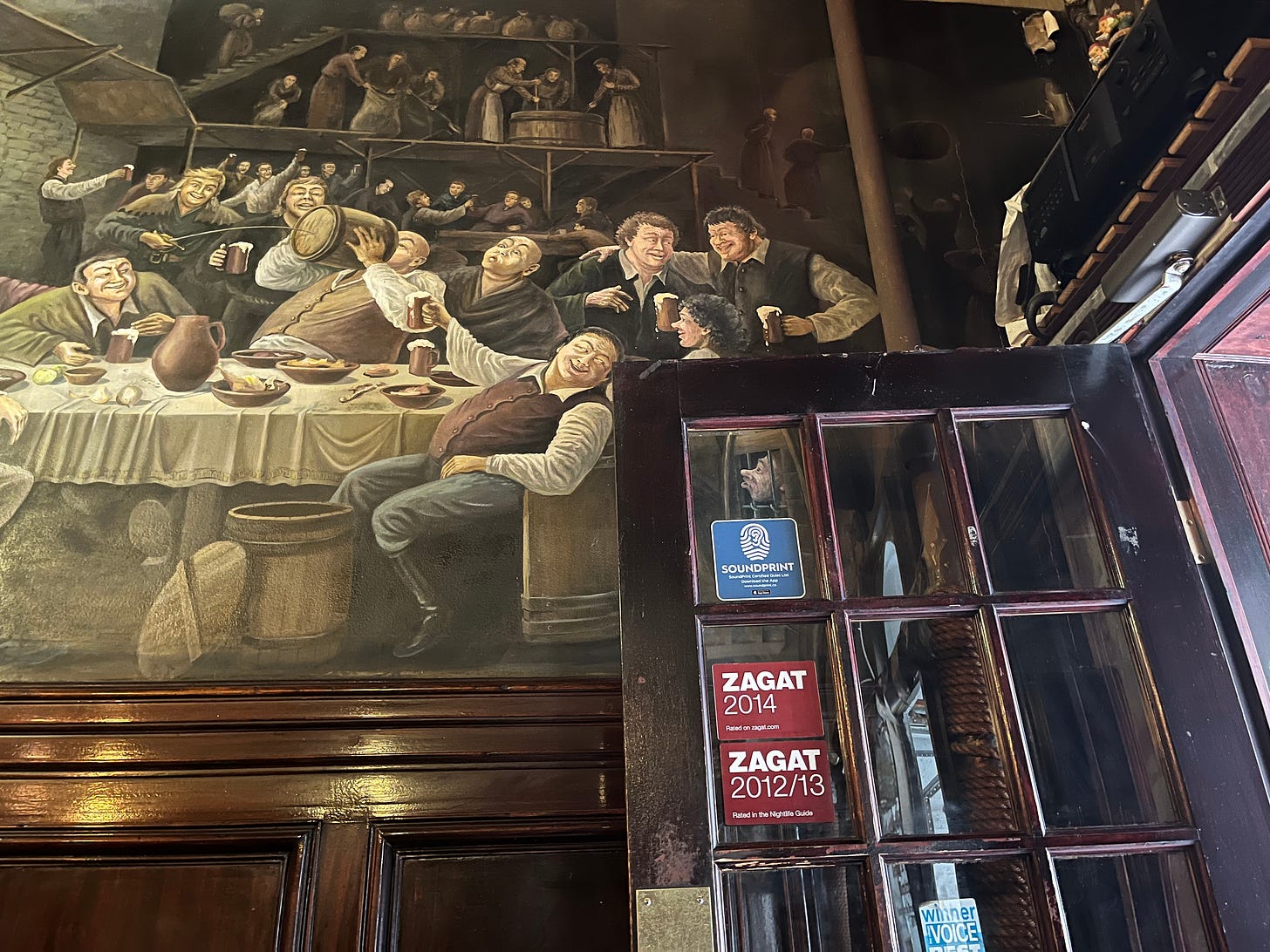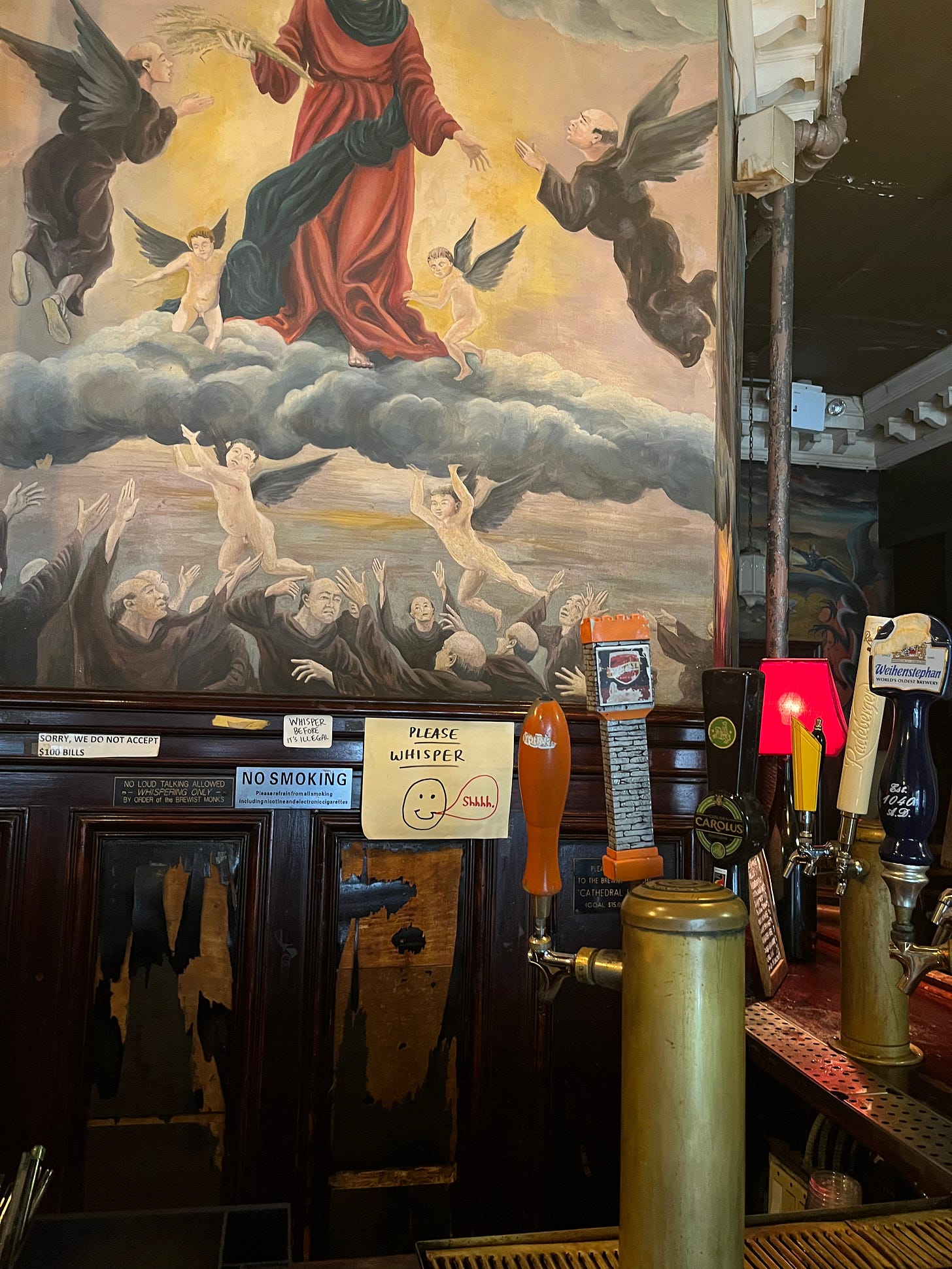The Paradox of Silence
On Saturday, my friend Sinclair took me to Burp Castle. It’s a bar with one rule: you have to be quiet. There are signs taped on the walls and on the door “Quiet please. Shh.” We decided to order beers, sit, and read our books in silence. Everything became amplified, especially the sounds of passerbys outside and their conversations that echoed through the open door, the hum of the AC, something dropping. It’s an amazing combination of being both in a library and a bar, and frankly strange to be in a bar – normally a place that is too loud and you can barely hear yourself speak – be a place where instead you have to whisper in order to have a conversation.
The bar was playing Medieval music at such a low volume that I only started to notice it after I had sat down and started reading. Two people in my peripheral vision were playing chess, a group of friends tried to hang out and whisper-gossip as the bartender occasionally shushed them when they laughed, and another woman was reading alone. The only book I had in my bag was one that I had just bought at a used bookstore, fittingly by Buddhist monk Thich Nhat Hanh. Sinclair was reading Middlemarch.
Anytime someone walked into the bar, I could feel their adjustment from the outside to the inside, from the loudness of the street to this quiet haven.
It made me think that silence actually brings out the best in us. It felt like the whole room was more connected than we would be in a loud crowd. We were all more in tune with each other’s movements.
On the walls of the bar I noticed the murals, illustrating loud scenes of men on ships and in pubs. The fact that there were paintings of men cheering pints of beer only made our silence more audible, like we were behind glass.
When we finally emerged back into the outdoors after an hour, I had a similar feeling I have after being in a sauna. It was collective healing from the rumbling world of speeding cars, ambulances, yelling strangers.
It’s amazing to be somewhere where silence is curated. There are other spots like this in the city. Whenever I’m at The New York Earth Room, I tilt my head toward the moist earth because there’s a specific silence that exists in the cushion of pure dirt, a sound absorption that feels refreshing and sacred.
On the radio the other day, I happened to be listening when a field recordist was being interviewed about his project recording the most quiet places on earth. Places where you can only hear the rustling of trees and occasionally a bird song. His attitude was that loud noises are unnatural and unhealthy and that silence is going extinct. It’s a rarity in our world, so he is recording these quiet places to preserve them, to make landmarks of silence.
But searching for quiet in a highly populated, dense, ‘big city’ can be contradictory. And maybe a bit selfish. We want to be alone, we want to have our own experience free of others. I notice this when I travel too - it’s easy to be needy for a solo experience. So, maybe it’s not something we need to hunt for, and instead something we can appreciate when it’s there.
In the summer, I notice the city is louder. Cars and motorcycles rev up my street, neighbors play loud bass-y music from their cars and Bluetooth speakers, people push their sounds into the boundaries of others. Some nights, it’s hard to fall asleep. I want to yell out the window in frustration (which is also a bit of a paradox - make noise in order to ask for quiet).
On the other hand, silence can also be found everywhere, even if it is only in small moments. As I’m writing this, I notice how often I can experience quiet if I allow myself to tune into it. Being alone at a train station, or inside the gallery in the morning before anyone else is there. Sometimes walking down a street has its quiet moments, even if it’s not full silence.
Thich Nhat Hanh explains in the book I was reading that, after a meditation, you don’t “hit” the bell, instead you “invite” the bell. I started to think about this in terms of inviting sounds instead of hearing them.
I do think there’s a way we can appreciate and search for more silence, all while inviting in the sounds. We can enjoy the loudness of a crowd — the togetherness of singing along to the same song at a concert or the incoherent chatter of strangers all conversing at once in a dark room, the humanness of noise — in order to appreciate the relief when the door has shut or the music has finally stopped, and the silence is a warm welcome.




You are so observant, silence is underrated in our noisy world. I admire your ability to shut off the world and retreat in a quiet zone. This is beautifully written